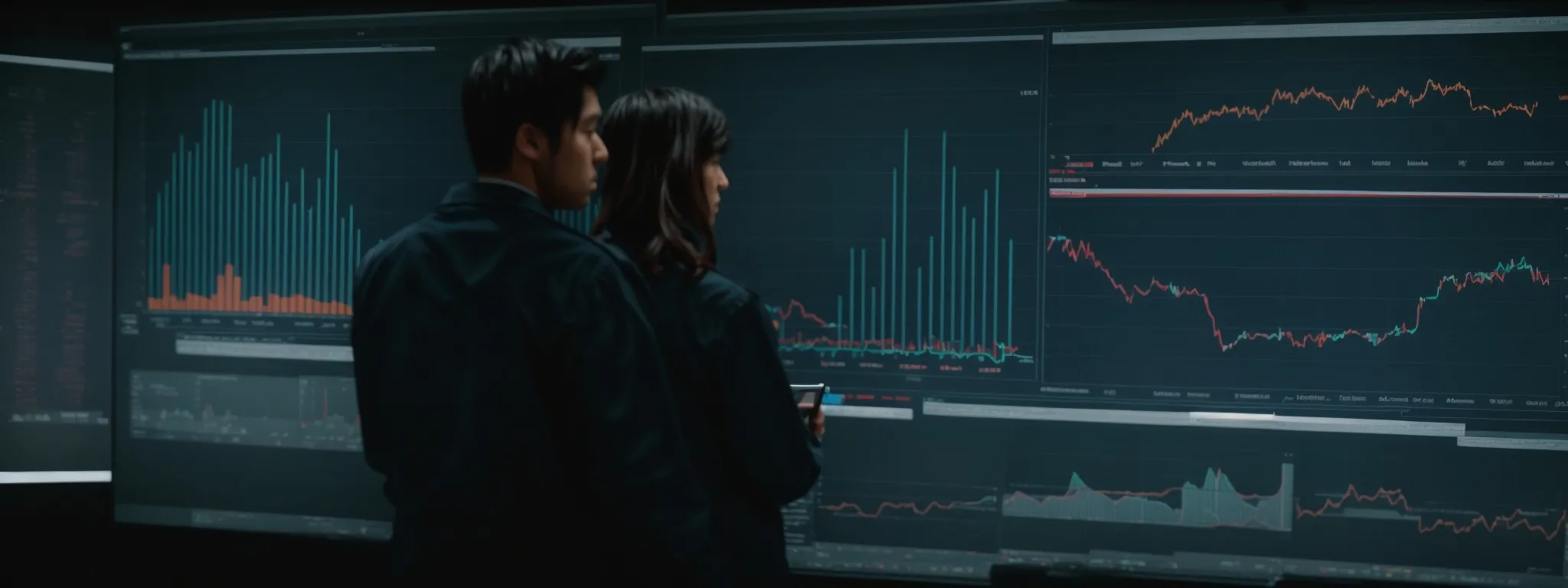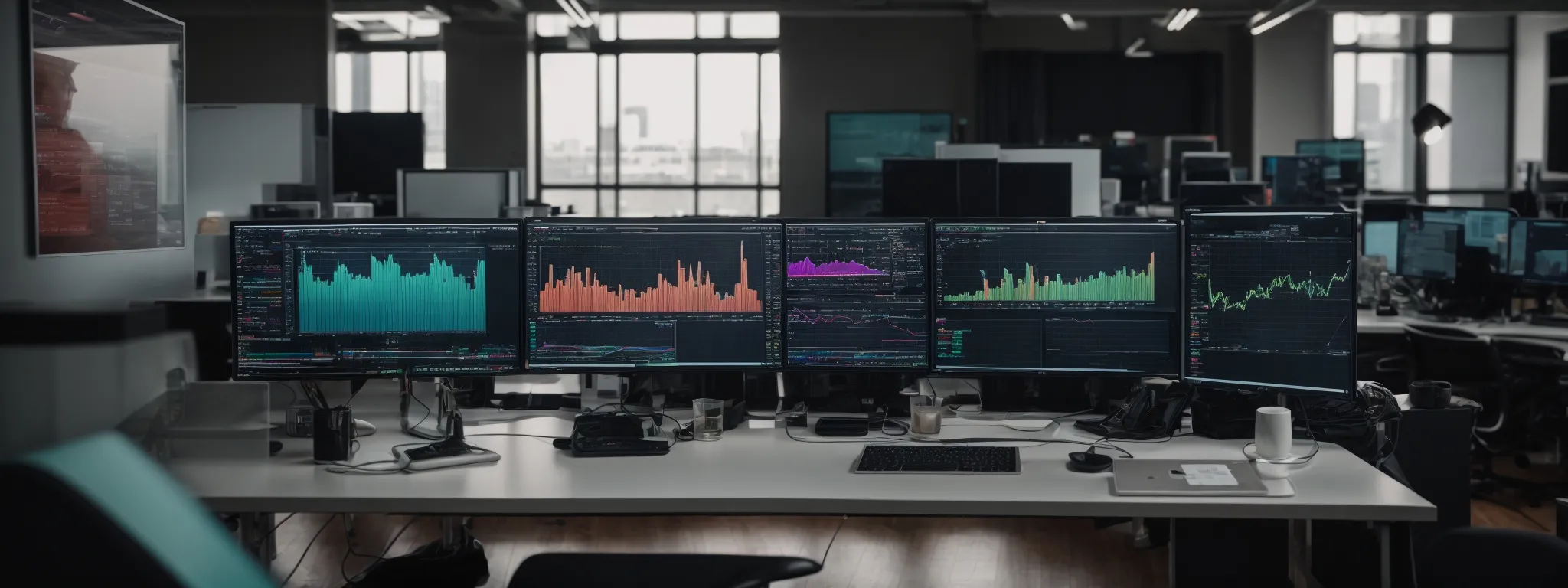Enterprise SEO Reporting Tips
Effective Strategies for Enterprise SEO Reporting Enterprise SEO reporting stands as the compass guiding businesses toward greater online visibility and brand reputation. By setting precise goals and […]
Effective Strategies for Enterprise SEO Reporting
Enterprise SEO reporting stands as the compass guiding businesses toward greater online visibility and brand reputation.
By setting precise goals and identifying the appropriate Key Performance Indicators (KPIs), companies can ensure their SEO strategies align with their overarching marketing campaigns.
Streamlined reporting tools, like those offered by LinkGraph, are crucial for effectively communicating SEO performance data across the varied audiences within an enterprise.
Tailored dashboards aid in translating complex metrics into actionable insights, fostering a culture of continuous improvement.
Continue exploring to uncover how effective reporting can transform data into SEO success stories.
Key Takeaways
- LinkGraph Provides Tailored SEO Reporting, Ensuring Alignment With Enterprise Business Goals and Stakeholder Needs
- Regularly Scheduled Reporting Meetings and Feedback Loops Are Fundamental for Collaborative Decision-Making in Enterprise SEO Strategies
- Dashboards Designed by LinkGraph Simplify Complex SEO Data, Making It Accessible and Actionable for a Variety of Stakeholders
- Continuous Refinement and Modernization of Tools and Methodologies Keep LinkGraph’s SEO Reporting Relevant and Effective
- LinkGraph’s SEO Reporting Strategies Emphasize the Importance of Data Consistency and the Integration of Real-Time Data for Informed Decision-Making
Setting Goals and Identifying KPIs

Embarking on a journey of search engine optimization requires more than dedication to escalating search rankings; it necessitates a masterful blend of strategy and analytics.
For enterprise businesses intent on refining their SEO campaign, it is paramount to chart a course for success with a clear set of objectives married to meaningful Key Performance Indicators (KPIs).
As they intertwine their SEO Efforts within the fabric of a comprehensive marketing strategy, defining what success looks like becomes the principle guidepost.
Ensuring KPIs echo the company’s overarching business aims allows for an alignment that not only fosters growth in search engine results but also propels the brand forward.
Establishing reliable benchmarks fortifies the foundation for adept KPI tracking, setting the stage for a narrative of progress and calculated advancement in the highly competitive digital arena.
Define What Success Looks Like for Your SEO Efforts
To crystallize a vision of success in SEO work, businesses must harness precise metrics that reflect their unique targets. Whether honing in on increased organic traffic, elevated brand authority, or higher conversion rates, each goal demands a tailored set of measures to track SEO performance effectively.
By crafting an SEO Dashboard that showcases real-time data on keyword ranks, backlink quality, and user engagement, enterprise companies can discern the impact of their SEO strategies. This transparent view empowers stakeholders to make informed decisions and pivot tactics to maintain a competitive edge in search engine rankings.
Select KPIs Relevant to Business Objectives
LinkGraph understands that in the realm of Enterprise SEO, grasping which KPIs align with a company’s specific business objectives is critical. These performance gauges should directly correspond to the primary goals of the enterprise, whether they aim to bolster web traffic, heighten brand reputation, or nurture lead acquisition.
Observing the nexus between selected KPIs and the company’s overarching ambitions can unveil insights into both the effectiveness of the current SEO program and areas ripe for optimization. LinkGraph’s meticulous approach to SEO reporting enables clients to concentrate on metrics like search engine rankings, site engagement rates, and conversion figures, ensuring each is relevant and contributes to the strategic narrative of the company’s progress.
Align SEO Goals With Overall Marketing Strategy
Incorporating SEO into an Enterprise’s Broader Marketing Campaign is not merely an act of synchronization; it is about ensuring that every SEO task propels the marketing objectives and, by extension, the overall aspirations of the brand. When SEO and marketing strategies move in concert, they create a formidable force that drives brand authority and captures the target audience’s attention effectively.
LinkGraph’s approach to integrating SEO with marketing strategies involves a detailed analysis that identifies synergy opportunities: optimizing landing pages to enhance user experience while reinforcing the campaign’s core message, streamlining a content strategy that supports both SEO and brand storytelling, and leveraging SEO data to refine marketing tactics. Alignment between SEO strategy and marketing goals is not a mere alignment; it’s a fusion that propels enterprise success:
- Optimizing landing pages for both conversion and search visibility
- Employing a cohesive content strategy that supports organic presence and brand messaging
- Utilizing SEO insights to fine-tune marketing campaigns for greater impact
Establish Benchmarks for KPI Tracking
Before an enterprise embarks on a meticulous journey of search engine optimization, setting benchmark standards for KPIs is critical. This establishes a baseline from which any progress can be measured, providing clarity on the efficacy of SEO efforts from the outset.
Benchmarks serve not merely as checkpoints but as beacons, guiding SEO teams to assess progress and pinpoint areas demanding attention or adjustment in their strategy: for instance, tracking improvements in keyword ranks post-SEO audit or gauging the increase in organic traffic after a content optimization exercise.
| SEO KPI | Benchmark | Goals |
|---|---|---|
| Organic Traffic | Baseline year-over-year data | Increase by 25% |
| Keyword Ranks | Current SERP positions | Top 10 for target keywords |
| Conversion Rate | Historical conversion data | Improve by 15% |
| Backlink Quality | Existing backlink profile strength | Enhance with high authority links |
Tailoring Reporting to Different Stakeholders

In the complex tapestry of enterprise SEO, the art of reporting is not one-size-fits-all.
Diverse stakeholders within an enterprise—from technical teams to executive leadership to marketing and sales departments—call for tailored communications that cater to their unique perspectives and concerns.
Effective enterprise SEO reporting transcends the dissemination of data; it involves curating customized reports that highlight relevant KPIs, crafting executive summaries that capture overarching impacts, and translating analytical insights into action-oriented strategies.
By customizing the narrative told by the data, SEO teams at LinkGraph can address the specific interests of every group involved, equipping them with the clarity and context necessary to support informed decision-making and strategic planning across all echelons of the company.
Customizing Reports for Technical Teams
In the realm of enterprise SEO, the technical cadre needs abstract data distilled into practicable insights. They require reports that dissect the intricacies of a site’s technical health, from sitemap adequacy to the intricacies of schema markup implementation:
| Technical SEO Element | Status | Impact on SEO | Recommended Action |
|---|---|---|---|
| Page Speed | Below target range | CTR decline | Optimize images, leverage browser caching |
| Mobile Responsiveness | Non-compliant areas detected | User experience compromised | Implement responsive web design guidelines |
| Broken Links | 45 found | Impacts crawl efficiency | Repair or remove faulty links |
LinkGraph curates the reporting paradigm to illuminate the SEO tasks that will bolster a site’s technical fortitude. This ensures technical teams are not wading through irrelevant metrics but can home in on data that inform direct SEO strategy enhancements and boost overall site performance.
Preparing Executive Summaries for Leadership
In the vanguard of enterprise SEO, executive leadership seeks condensed, high-level insights that directly impact decision-making and ROI. LinkGraph’s executive summaries cut through the data clutter, delivering sharp, strategic insights that align with leadership’s vision, spotlighting overarching SEO performance trends and dictating the direction of future investments in SEO services.
LinkGraph caters to the C-suite by crafting executive summaries that underscore significant SEO milestones, distill the substance of complex SEO analytics, and furnish leaders with a clear picture of how SEO initiatives correlate with business growth and market positioning. This laser-focused reporting ensures that senior executives can quickly apprehend the value derived from SEO endeavors and make agile, informed strategies.
Highlighting KPIs for Marketing Departments
Within the domain of marketing departments in an enterprise setting, KPIs stand as the lighthouse, guiding content marketers and strategists through the mercurial waters of search engine optimization. LinkGraph excels in furnishing marketing departments with reports that emphasize the effectiveness of content strategies and campaigns, focusing on how these efforts align with user behavior and marketplace trends.
LinkGraph’s specialized reporting tools for marketing departments pivot on actionable insights derived from user engagement, content reach, and conversion metrics, empowering content marketers to refine their approaches in real-time. The company’s approach ensures marketing personnel are equipped with relevant data to optimize content creation and distribution, continually enhancing the enterprise’s competitive stance in search rankings.
Addressing Concerns of the Sales Team Through Data
In the theatre of sales, the team’s focus converges on turning SEO insights into tangible revenue. LinkGraph recognizes this imperative and crafts SEO reports that distill complex SEO data into clear indicators of potential client interest and market demand, thereby providing the sales force with a sharper tool for targeting and conversion.
The synergy of SEO and sales is fortified when the latter receives data-driven narratives that connect SEO performance with customer behavior and sales cycles. LinkGraph’s reporting equips sales professionals with pertinent information, ensuring they understand how SEO-driven Leads translate into sales opportunities and, ultimately, business success.
Utilizing the Right Tools for SEO Data Collection

In the intricate landscape of enterprise SEO reporting, selecting the right assortment of analytical tools is pivotal for harvesting precise and actionable data.
Enterprises must critically assess the multitude of SEO tools available, ensuring that each offers high levels of accuracy and contributes to a comprehensive dataset.
The integration of disparate tools must be executed in a manner that streamlines data collection processes, potentially harnessing automation to amalgamate data efficiently and minimize manual toil.
Beyond the aggregation phase, it is essential to establish protocols for data consistency to ensure uniformity across all platforms.
This methodical approach to tool selection and data synthesis lays the groundwork for robust, reliable SEO reporting that underpins strategic decision-making.
Assess Various SEO Tools for Data Accuracy
In the pursuit of search engine optimization, the precision of SEO tools used for gathering data is of paramount importance. LinkGraph, standing as an exemplary enterprise SEO agency, rigorously evaluates SEO software and tools to ensure the accuracy and reliability of the SEO data collected, thus enabling enterprises to make data-driven decisions with confidence.
Choosing the correct SEO analytics platform is not merely about collecting data, but about obtaining meaningful insights that can steer a company’s SEO efforts. LinkGraph’s criteria for assessment prioritize tools that demonstrate consistent performance across key SEO metrics such as keyword ranks, backlink profiles, and site audit results, ensuring that every piece of data holds substantial value for the enterprise’s SEO strategy.
Integrating Tools for Streamlined Data Collection
LinkGraph’s enterprise SEO platforms are adeptly designed to integrate various SEO tools, fostering a harmonious ecosystem where data collection is not a patchwork but a seamless tapestry. The synthesis enables the SEO team to operate efficiently, capturing robust datasets without the friction of juggling disparate systems or wrestling with incompatible formats.
Through this strategic integration, the company ensures a continuous flow of SEO performance data, which is crucial for ongoing enterprise SEO campaigns. This adept amalgamation of technology translates into a comprehensive view of an enterprise’s digital footprint, critically informing SEO strategy and supporting a dynamic response to search engine algorithm changes.
Automating Data Aggregation Where Possible
In the realm of enterprise SEO, the capacity to harvest data efficiently hinges on the automation of data aggregation. LinkGraph, cognizant of the labor-intensive nature of manual data collection, has put considerable emphasis on harnessing enterprise SEO tools that can automate the aggregation process, thereby Streamlining the Assimilation of SEO Data while augmenting the productivity of SEO teams.
This automation ensures a real-time influx of performance data, integral for swift, strategic decision-making and fine-tuning of SEO campaigns. By minimizing manual effort, LinkGraph facilitates a quicker realization of data insights, offering clients a robust, responsive approach to managing and adapting their SEO strategies in an ever-evolving digital marketplace.
Ensuring Data Consistency Across Different Tools
In the meticulous environment of enterprise SEO, guaranteeing data consistency across varying tools is not just advantageous; it is imperative. LinkGraph operationalizes precise protocols to ensure that despite the diversity of SEO tools utilized, the data harvested remains uniform, thus empowering enterprises with a consistent, dependable analytical foundation.
LinkGraph champions a rigorous standardization process that reconciles disparate data points, fostering an unwavering consistency that upholds the integrity of SEO reporting. This steadfast method validates the comparative analysis and provides an accurate representation of SEO performance, pivotal for strategic decision-making.
Streamlining Data With Effective SEO Dashboards

In the nuanced world of enterprise SEO, the potency of a well-constructed dashboard cannot be overstated.
Leveraging such an integral tool, businesses embark on a transformative process, metamorphosing raw data into strategic insights with remarkable efficacy.
These dashboards, when expertly designed, serve as the linchpin for at-a-glance insights, inviting a broad spectrum of users to engage with real-time data.
They strike a harmonious balance, distilling complexities into digestible simplicity and employing data visualization techniques to enhance comprehension.
For enterprises committed to surmounting the challenge of dynamic reporting, these dashboards stand as both a beacon and a compass, illuminating the path forward and directing SEO initiatives with precision.
Designing Dashboards for at-a-Glance Insights
For enterprise SEO, dashboards that deliver concise insights at a glance are a cornerstone of effective strategy communication. LinkGraph’s SEO dashboards are precision-engineered to highlight key data, ensuring that every stakeholder can quickly grasp the status and trajectory of current SEO campaigns.
The design of these intuitive dashboards prioritizes ease of use, with a focus on presenting complex data through visual representations that simplify interpretation and foster immediate understanding:
- Interactive charts and graphs that delineate trends in real-time
- Customizable widgets that present data according to user preference
- Color-coded indicators to reflect performance against set benchmarks
LinkGraph’s dashboards empower users with the capability to monitor crucial SEO KPIs, optimizing the decision-making process. This strategic approach minimizes the time spent deciphering data, channeling focus on action and strategy refinement.
Incorporating Real-Time Data for Dynamic Reporting
In today’s fast-paced digital landscape, the ability to harness real-time data stands as a game-changer for reporting on enterprise SEO initiatives. Accurate, up-to-the-minute insights from LinkGraph’s SEO dashboards allow enterprises to respond nimbly to market changes, ensuring SEO strategies are adapted swiftly to maintain competitive advantage:
| SEO Metric | Real-Time Status | Actionable Insight |
|---|---|---|
| Search Rankings | Live SERP tracking | Adjust content optimization tactics |
| Website Traffic | Current user flow analysis | Improve landing page designs |
| Conversion Rates | Instantaneous conversion tracking | Refine call-to-action elements |
Embracing dynamic reporting through the integration of real-time data, LinkGraph empowers clients to stay abreast of their digital presence. SEO performance dictates immediate strategy adjustments and enhances overall campaign effectiveness, leading to a robust enterprise SEO framework capable of weathering the ever-evolving digital environment.
Balancing Detail and Simplicity in Dashboards
LinkGraph’s proficiency in designing SEO dashboards carves out a pivotal space where detail does not compromise simplicity. The careful curation of these dashboards maintains high-detail analytics while presenting them in an accessible format, ensuring the information is actionable and not overwhelming.
These dashboards stand as a testament to LinkGraph’s understanding that balance is key; they offer stakeholders a distilled essence of complex SEO data, enabling swift interpretation and facilitating strategic decisions without the need for deep dives into granular data.
Using Data Visualization for Better Understanding
LinkGraph harnesses data visualization to transcend the barriers of complex data interpretation, providing clients with a clear visual narrative of their SEO efforts. Through strategic use of graphs, heat maps, and progression timelines, the nuances of search rankings, backlink efficacy, and audience behavior become comprehensible at a glance.
Employing advanced visualization techniques, LinkGraph ensures that every nuance of an enterprise’s SEO journey is vividly presented, fostering a better understanding among teams and stakeholders. This approach allows users to quickly identify trends, anomalies, and opportunities within the SEO data, streamlining the pathway to informed strategy adjustments and technical interventions.
How to Categorize KPIs for Clarity and Impact

Within the dynamic framework of enterprise SEO reporting, the astute categorization of Key Performance Indicators (KPIs) emerges as a fundamental constituent for augmenting clarity and magnifying impact.
Business leaders and SEO specialists must extract valuable insights from an ocean of data by deftly segregating KPIs to articulate the narrative of their SEO initiatives effectively.
Differentiating between lead and lag indicators offers foresight into the efficacy of deployed strategies, while grouping KPIs by channel and campaign affords a nuanced understanding of performance across different touchpoints.
Prioritizing KPIs ensures a laser focus on metrics that drive decision-making and underpin pivotal changes in direction.
Additionally, crafting a hierarchy of metrics within reports demystifies data, aligning it with strategic goals and facilitating swift, informed action.
This introductory exploration sets the stage for a deeper discernment of structuring KPIs to serve as the compass by which enterprises navigate the complexities of SEO campaigns and reporting.
Differentiating Between Lead and Lag Indicators
In the intricate process of enterprise SEO reporting, discerning between lead and lag indicators is a vital practice that enhances decision-making precision. Lead indicators, often proactive and predictive in nature, provide insights into future performance and guide SEO teams on the potential success of current strategies, enabling adjustments ahead of time.
Lag indicators, by contrast, offer a retrospective glance at the effectiveness of SEO maneuvers, serving as a reliable gauge of past activities. They measure tangible outcomes, such as conversions or revenue growth, giving businesses a clear picture of the ROI generated from implemented SEO strategies.
Grouping KPIs by Channel and Campaign
Grouping KPIs by channel and campaign equips enterprise businesses with the precision to isolate and evaluate the performance of diverse marketing initiatives effectively. This stratification enables an organization to monitor specific segments such as organic search, paid advertising, or social media with tailored KPIs that resonate with the unique dynamics of each channel.
An astute analysis of campaign-related KPIs offers discernible insights into the success of individual marketing endeavors, enabling SEO specialists to synergize and optimize across multiple fronts. By categorizing KPIs in this manner, enterprises enhance the cogency of their data, ensuring they can attribute outcomes directly to the corresponding channels and campaigns with a greater degree of accuracy.
Prioritizing KPIs for Decision-Making
In the practice of enterprise SEO reporting, the art of prioritizing Key Performance Indicators (KPIs) stands as a linchpin for impactful decision-making. Focusing on KPIs closely aligned with business outcomes—such as lead generation, e-commerce sales, or customer acquisition costs—allows an enterprise to channel its analytical energy toward metrics with the greatest potential to influence business strategies and revenue.
Compiling a hierarchy among KPIs drives an efficient allocation of resources, enabling an enterprise to respond quickly to high-priority indicators and apply strategic modifications where necessary:
| KPI Category | Priority Level | Expected Impact |
|---|---|---|
| Conversion Rate | High | Directly relates to revenue and profitability |
| Organic Traffic | Medium | Indicates brand visibility and audience reach |
| Click-Through Rate (CTR) | Low | Reflects content efficacy and user interest |
This stratification of KPIs into a clear framework ensures that decisive actions are taken based on the most consequential data points, thereby enhancing the overall agility and effectiveness of an enterprise’s SEO strategy.
Establish Metrics Hierarchy Within Reports
Within the realm of enterprise SEO reporting, constructing a hierarchy of metrics within reports is akin to charting a map for a complex expedition: it organizes the journey, prioritizing crucial waypoints over less significant landmarks. By laying out KPIs in a structured manner, reports become actionable tools that guide stakeholders through the data landscape, highlighting the most pivotal information that demands attention and action.
Strategically placing metrics in descending order of importance within enterprise SEO reports ensures immediate visibility of high-impact data, streamlining the decision-making process:
- Elevate critical metrics like conversion rates and revenue impact for top-level visibility.
- Position secondary metrics such as bounce rate and page views to support context.
- Provide tertiary data, like time on site, to deepen understanding of user engagement.
This layered approach not only enhances comprehension across different levels of an organization but also empowers quick engagement with the narrative constructed by the SEO journey. It anchors the report’s content into digestible segments, facilitating strategic adjustments and maintaining focus on the enterprise’s SEO objectives.
Examples of Impactful SEO Reporting Strategies

In the intricate ecosystem of enterprise search engine optimization, adept reporting strategies cultivate an environment where data transmutes into actionable insights, propelling SEO initiatives to new heights.
As enterprises seek to fortify their position within the digital marketplace, the implementation of strategic SEO reporting underpins the quest for enhanced visibility and optimization.
The subsequent exploration of examples will delineate the subtleties of benchmarking current performance against industry norms, tailor-fitting reports to specific segments and markets, applying cohort analysis for longitudinal SEO trend assessment, and weaving competitive analysis into the reporting tapestry.
Each strategy is a cog in the larger SEO machinery, essential for dissecting performance and informing strategies that resonate with precision, relevance, and competitive acuity.
Benchmarking Current Performance Against Industry Standards
Benchmarking is an essential tactic in SEO reporting that positions an enterprise’s performance within the broader industry panorama. It provides a comparative lens to evaluate where the company stands in relation to competition and best practices, ensuring SEO strategies are honed to outpace industry standards.
This practice not only underscores areas where the enterprise excels but also brings to light segments where improvement is imperative. By mapping out the competitive landscape, companies gain the strategic foresight to allocate resources efficiently and capitalize on market opportunities:
- Analyzing market position through keyword rankings and domain authority.
- Assessing content quality, structure, and optimization against top-performing competitors.
- Measuring backlink profiles to understand the brand’s web presence compared to industry leaders.
Customizing Reports for Different Segments and Markets
When addressing the multifaceted nature of enterprise SEO, LinkGraph distinguishes itself by delivering customized reports tailored to the diverse needs of different market segments. This approach ensures that each client receives insights and analytics that resonate with the granular specifics of their particular industry, audience, or geographical focus.
LinkGraph’s precision in segmenting reports allows for strategic application of insights specific to market sectors, empowering stakeholders to make pivotal decisions grounded in data meticulously curated for their segment’s unique digital landscape. This hyper-relevant information architecture paves the way for refined strategies that resonate with precision and intent.
Utilizing Cohort Analysis for SEO Performance Trends
Incorporating cohort analysis into SEO performance trends equips enterprise businesses with the ability to segment user data over time, revealing how distinct groups interact with the website across different stages of the marketing funnel. LinkGraph leverages this technique to identify patterns and behaviors that inform more targeted and effective SEO strategies, identifying areas of optimization that directly correlate with user acquisition and retention.
LinkGraph’s use of cohort analysis in SEO reporting underscores the shifts in user engagement and organic search performance across varying time frames, giving enterprises a clearer view of the long-term effectiveness of their SEO initiatives. This analytical approach enables clients to see beyond immediate metrics, facilitating a deeper comprehension of the lifecycle of their SEO efforts and their impact on overarching business objectives.
Integrating Competitive Analysis Into Regular Reporting
An astute approach to SEO reporting for enterprise concerns incorporates regular competitive analysis, shedding light on how competitors are positioning themselves within the same market. Initiating a comparison of backlink profiles, content quality, and keyword strategies enables companies to identify potential areas of underperformance and capture actionable insights that carve out pathways to market leadership.
By weaving competitive analysis into the fabric of regular SEO reporting, LinkGraph allows clients to remain vigilant, benchmarking their strategy against the competitive landscape. Companies emerge equipped with the knowledge to steer around potential challenges, seize market opportunities, and refine their SEO strategies to stay ahead:
- Tracking competitor search rankings to spot market trends and shifts.
- Assessing competitor user experience and site optimizations as benchmarks for improvement.
- Evaluating competitor content distribution networks to identify new link building avenues.
Make the Dashboard Reporting Digestible

In the intricate domain of enterprise SEO, the synthesis of effective reporting pivots on delivering complexities in a manner that is both comprehensible and accessible to stakeholders across the board.
It is here where the prowess of a well-constructed dashboard becomes invaluable, acting as a conduit through which voluminous data is filtered and presented as clear, digestible insights.
As the quintessential intersection where data meets decision-making, a meticulously designed dashboard transcends its function as a simple reporting tool, evolving into a strategic asset.
It accomplishes this by simplifying intricate data for diverse audiences, weaving narrative storytelling into the fabric of reporting, embedding actionable insights within its core, and enhancing understanding with strategic annotations and thorough explanations.
Therefore, the objective is not merely to report but to enlighten, engage, and empower diverse stakeholders through tailored communication and insightful analysis.
Simplifying Complex Data for Non-Technical Audiences
Demystifying SEO analytics for non-technical audiences is a specialized endeavor that LinkGraph executes with precision. By transforming SEO data into compelling visuals and intuitive formats, even those without a background in SEO can readily appreciate the implications and recognize the trajectory of their enterprise’s online performance.
The inadvertent complexity inherent in SEO reporting poses a barrier for stakeholders not versed in the jargon of search engine optimization. LinkGraph addresses this gap by ensuring each SEO dashboard offers simplified, actionable data, enabling a clear understanding of key metrics and fostering informed decision-making across the enterprise:
| SEO Metric | Simple Description | Impact on Business |
|---|---|---|
| Organic Search Traffic | Number of visitors from search engines | Indicates brand reach and audience interest |
| Keyword Rankings | Position on search engine results pages | Reflects visibility for target market queries |
| Backlink Count | Number of external sites linking back | Assesses authority and trustworthiness online |
| Bounce Rate | Percentage of single-page sessions | Helps understand user engagement depth |
Through LinkGraph’s strategic approach, even individuals with a cursory understanding of SEO can interpret complex analytics and contribute meaningfully to discussions on the enterprise’s SEO strategy. Reporting tools are carefully crafted to communicate nuances transparently, allowing a broad range of stakeholders to grasp the significance behind search performance data with ease.
Using Narrative Storytelling to Report Findings
Narrative storytelling has emerged as a compelling method within LinkGraph’s SEO reporting to convey intricate data trends and SEO insights. This approach contextualizes the arc of an enterprise’s SEO efforts, engaging stakeholders by presenting the data’s progression as a story with a compelling beginning, rise in action, and current climax, fostering a deeper connection with the data and its implications on the enterprise’s objectives.
In wielding the power of narrative, LinkGraph ensures that the findings from an SEO campaign are not just cold numbers, but rather a persuasive chronicle of the enterprise’s journey in search engine optimization. By articulating data as a narrative, each report becomes an accessible and memorable account of success, challenges, and opportunities, imprinted in the stakeholders’ minds as a vivid map of their digital ascent.
Including Actionable Insights in Dashboards
In the intricate sphere of enterprise SEO, actionable insights serve as the lifeblood of effective dashboard reporting. LinkGraph elevates the utility of dashboards by infusing them with strategic recommendations that spring from data analysis, transforming raw numbers into decisive actions that businesses can implement promptly to refine their online presence.
With LinkGraph’s innovative approach, each dashboard transcends mere data presentation, becoming a roadmap for tactical SEO maneuvers. Stakeholders are provided with clear directives based on performance metrics, ensuring that their engagement with the dashboard yields concrete steps towards enhancing their enterprise’s search engine optimization outcomes.
Enhancing Reports With Annotations and Explanations
Embedding annotations and thorough explanations within SEO reports elevates the comprehensibility of complex data, guiding stakeholders through the analytical landscape. LinkGraph’s detailed clarifications transform SEO dashboards into informative guides, where each data point is accompanied by insightful commentary, expounding on the reasons behind fluctuations and trends.
LinkGraph distinguishes its reporting strategy by meticulously articulating the implications behind the metrics, ensuring that the narrative of the data is understood in its entirety. This thorough exposition of the data safeguards stakeholders’ ability to perceive the subtleties of SEO activities, forging a bridge between raw numbers and strategic implications for the enterprise.
Communication Is Key in SEO Reporting

Effective communication serves as the cornerstone of any successful enterprise SEO initiative, weaving together data analysis, strategic planning, and stakeholder collaboration.
At the nexus of enterprise SEO reporting lies the imperative to convey findings and insights in a way that resonates across an organization’s hierarchy, ensuring everyone from the SEO team to the executive suite can act upon the information with clarity and purpose.
To achieve such synergy, LinkGraph champions a myriad of communication strategies: scheduling routine reporting meetings, fostering a feedback-rich environment to refine reporting efficacy, synchronizing report delivery with critical business cycles, and instituting comprehensive documentation procedures.
These practices coalesce to craft a robust communication framework, vital for the seamless transformation of SEO reporting into palpable business value.
Schedule Regular Reporting Meetings With Stakeholders
Regular reporting meetings are a linchpin in LinkGraph’s communication strategy, fostering clear dialogue between SEO teams and stakeholders. These scheduled interactions serve as a pivotal forum for discussing SEO reporting findings, aligning on strategic shifts, and solidifying stakeholder commitment to the implemented SEO efforts.
The practice of convening routine meetings ensures that all parties remain apprised of SEO campaign progress and fosters a culture of transparency and collaboration. Results, trends, and next steps are relayed with precision, granting stakeholders an avenue for input and facilitating a cohesive approach to enterprise SEO endeavors:
- SEO team presents current data and insights pertaining to the enterprise’s digital performance.
- Stakeholders furnish feedback, pose questions, and contribute to the discussion around future strategies.
- Action items and strategic SEO plans are collaboratively developed and agreed upon.
Encourage Feedback to Improve Report Usefulness
LinkGraph champions a responsive, data-driven culture by advocating an open line of communication where client feedback is integral to enhancing the utility of reports. This receptive approach invites clients to share their insights on the report’s format, data presentation, and overall relevance, ensuring the continual honing of reporting tools to meet the specific requirements of an enterprise’s stakeholders.
By actively incorporating client perspectives into the refinement of SEO reporting strategies, LinkGraph strengthens the alignment between SEO data and the strategic objectives of the enterprise. The company’s dedication to feedback underscores a commitment to deliver reports that not only inform but also empower clients to drive action and optimize their SEO campaigns with precision.
Aligning SEO Report Delivery With Business Cycles
LinkGraph expertly synchronizes the cadence of SEO Report delivery with the rhythm of business cycles, meshing the ebb and flow of data insights with key decision-making junctures. This intentional alignment ensures that businesses receive performance insights when it’s most impactful: during strategic planning, budget reviews, and campaign shifts.
The company’s astute timing of report dissemination underscores the importance of integrating SEO analytics with moments of critical business reflection and adjustment. As a result, enterprises can make data-informed decisions that are not only timely but also resonate with the natural progression of their fiscal and operational calendars:
| Business Cycle Phase | SEO Report Focus | Strategic Advantage |
|---|---|---|
| Quarterly Planning | Previous quarter results and insights | Informing the next quarter’s SEO strategy |
| Annual Budgeting | Year-end summary and ROI analysis | Guiding budget allocation for SEO initiatives |
| Product Launches | Real-time campaign performance | Agile optimization for maximum market impact |
Create Documentation for SEO Reporting Processes
LinkGraph prioritizes the establishment of well-defined documentation practices within its SEO reporting processes. This methodology serves to detail every aspect of reporting, from the initiation phase through to delivery, assuring a level of consistency and quality control essential for enterprise-grade SEO analysis.
The creation of comprehensive documentation provides an invaluable reference that enables seamless onboarding for new team members and serves as a guide for ongoing projects. LinkGraph’s commitment to documentation enshrines its SEO reporting protocols, delivering a clear blueprint for replicating success across various campaigns and client engagements.
Continuous Improvement in SEO Reporting Practices

In the fast-evolving sphere of enterprise SEO, the pursuit of excellence in reporting is never static.
As part of LinkGraph’s unwavering commitment to deliver consummate clarity and actionable insights to its clients, the company embraces the ethos of continuous improvement.
By setting up feedback loops for refined analytics delivery, experimenting with A/B testing for report formats, perpetually modernizing tools and methodologies, and remaining attuned to the latest search engine developments, LinkGraph maintains an edge in providing cutting-edge SEO reporting.
These tried-and-true processes ensure that every report not only meets the current needs of enterprise businesses but also anticipates future trends, forging a path of sustained advancement and meticulous insight.
Setting Up Feedback Loops for Report Refinement
Within the domain of enterprise SEO, LinkGraph champions the principle of iterative enhancement through the strategic implementation of feedback loops. These channels are essential, as they provide the metrics by which the firm evaluates report effectiveness and discerns client satisfaction, ensuring continuous upticks in the value of each SEO report rendered.
Adopting feedback loops as a part of routine SEO reporting practices allows for the nuanced calibration of analytics and recommendations. LinkGraph utilizes this systematic input to refine reporting frameworks, ensuring that every nuance of the data presented aligns perfectly with client expectations and the dynamic requisites of their enterprise SEO strategies.
Utilizing a/B Testing for Report Formats and Content
LinkGraph strategically employs A/B testing to evaluate report formats and content, ensuring the delivery of SEO reporting that resonates with both clarity and relevance. By comparing varying configurations, the agency identifies layouts and narratives that enhance client comprehension and engagement with the data presented.
Understanding the nuances of enterprise preferences, LinkGraph’s deployment of A/B testing paves the way for optimized SEO report structures. This method allows clients to interact with different report styles, directly influencing the development of reporting tools tailored to their specific decision-making processes and corporate culture.
Regularly Updating Reporting Tools and Methodologies
In the dynamic landscape of enterprise SEO, LinkGraph prioritizes the renewal and enhancement of SEO reporting tools and methodologies to ensure clients benefit from the most advanced features and accurate data. By keeping pace with evolving analytics technologies and algorithm updates, the firm guarantees that its reporting capabilities surpass industry standards, offering enterprises a competitive edge in the digital marketplace.
LinkGraph understands that the utility of an SEO report is only as powerful as the tools that create it; to that end, the company is committed to routine updates and rigorous evaluations of their reporting systems. This continuous modernization ensures that clients receive insights drawn from the latest in data analytics, thereby enabling robust, data-driven strategies that drive SEO success:
| SEO Reporting Area | Tool/Methodology Update | Client Benefit |
|---|---|---|
| Data Collection | Integration of advanced crawling technologies | Increased accuracy in website and competitor analysis |
| Analytics Platform | Implementation of AI-enhanced predictive analytics | Strategic foresight into market trends and user behaviors |
| Dashboard Customization | Adoption of real-time data visualization features | Improved decision-making with up-to-the-minute performance metrics |
Staying Updated With Search Engine Evolution and Its Impacts
In the domain of enterprise SEO reporting, remaining conversant with the latest search engine evolutions is integral. LinkGraph deftly navigates these transformative currents, assessing the implications of algorithm shifts and updating SEO strategies to maintain clients’ search ranking stability and growth.
LinkGraph’s adaptation to search engine evolution ensures SEO reports reflect the most contemporary practices, enabling enterprises to adjust their strategies proactively. This dynamic approach secures a competitive advantage by preempting changes in the SEO landscape and shielding businesses from potential impacts.
Conclusion
Effective strategies for enterprise SEO reporting are critical to navigating the complexities of search engine optimization and transforming raw data into actionable insights that drive business success.
By setting clear goals, choosing relevant KPIs, and aligning them with overall business objectives, enterprises chart a course towards substantial growth in search visibility and performance.
Customized reporting caters to diverse stakeholders, ensuring that each receives tailored insights reflective of their interests.
Utilizing the right mix of tools for data accuracy, integration, automation, and consistency is paramount in collecting reliable data.
Dashboards that balance detail with simplicity, incorporate real-time data, and utilize visualization techniques enable intuitive at-a-glance insights that inform decision-making.
Categorizing KPIs effectively ensures clarity and impact, enabling enterprises to prioritize metrics that influence strategic decisions.
Regular communication, documentation, and feedback loops reinforce the continuous improvement of SEO reporting practices.
Lastly, staying up-to-date with search engine evolutions enables businesses to adapt proactively, ensuring that their SEO strategies yield robust results in an ever-changing digital landscape.














































































